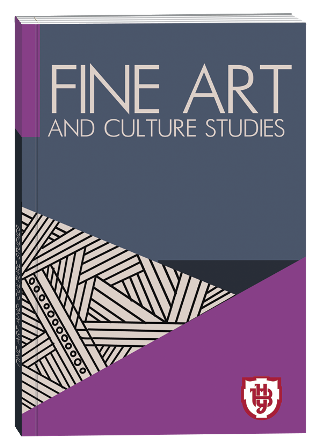SYNTHESIS OF EUROPEAN TRADITIONS AND NATIONAL SPECIFICITY IN THE CREATIVE WORK OF QIGANG CHEN (ON THE EXAMPLE OF A CONCERT FOR CELLO AND ORCHESTRA REFLET D`UN TEMPS DISPARU)
DOI:
https://doi.org/10.32782/facs-2023-1-19Keywords:
cello concerto, Qigang Chen, pentatonic, Chinese folk music, synthesis of traditions, avant-garde,Abstract
The article is devoted to the consideration of the synthesis of elements of Eastern and Western cultures in a cello concerto by one of the most famous Chinese composers of our time, Qigang Chen. The composer carries out an important mission of demonstrating Chinese music to the world cultural space, and in various forms of his activity – composing, conducting, organizing and performing – strives to bring professional music of the West closer to the traditional music of the East. The composer develops throughout his entire career the idea of such a synthesis, embracing the entire world musical culture and supported by a religious and philosophical worldview. The concert for cello and orchestra Reflet d`un temps disparu (1995–1996) is notable for its style originality, vivid artistic imagery, organic combination of Chinese folk art traditions and composer music styles of the XX century. The composition is characterized by exclusivity, sometimes uniqueness of musical means and compositional and dramatic patterns. Qigang Chen refers to Chinese culture at different levels: modal (pentatonic), melodic (citation of a folk song and variant principles of its development, ornamentation), metro-rhythmic, textural, timbre, combining national musical "codes" with the characteristic features of French music. The pitch of the concerto has the parameters of 12-tones, free atonality, freely interpreted dodecaphony, microchromatics. French features are realized in colorful multi-tertian consonances – diatonic scales, whole-tone verticals and horizontals, characteristic of Achille-Claude Debussy, a complex metrical organization formed as a result of additional durations, reminiscent of the style of Qigang Chen's teacher – Olivier Messiaen. The principles of the teacher's thinking (in the field of modes, rhythm) are embodied in a free form. The work of Qigang Chen embodies the idea of a dialogue between East and West in its modern sense: revealing the commonality of two civilizations, the composer emphasizes their originality. By means of the musical language, the composer embodies the philosophical ideas belonging to both Western and Eastern civilizations.
References
Ван Інзюнь. Генеза становлення теорії та методики навчання гри на віолончелі. Проблеми підготовки сучасного вчителя. Вип. 2. Умань, 2015. С. 6–13.
Дай Юй. Элементы традиционной культуры в новой китайской музыке «периода открытости»: дисс. … канд. иск. 2017. 238 с.
Лупинос С. Б. Этнокультурные основания общности ладоакустических терминов трактатов «Люй люй синьшу», «Акхак квебом» и «Гаккароку». Университетский научный журнал. Филологические и исторические науки, археология и искусствоведение. № 48, 2019. С. 3–47.
Пэн Чэн. Ладовая система китайской музыки и её претворение в музыке XX века: дисс. … канд. иск. 2011. 301 с.
Фань Юй. Серийная техника в китайской камерно-инструментальной музыке 1980-1990-х годов: дисс. … канд. иск. 2019. 243 с.
Фу Сяоцзін. Методика концертмейстерської підготовки майбутніх учителів музики України і Китаю: автореф. дис. … канд. пед. наук.: 13.00.02. Київ, 2012. 20 с.
Холопов Ю. Н. Пентатоника как род интервальных систем. Пентатоника в контексте мировой музыкальной культуры: Материалы межреспубликанской научной конференции. 1–2 ноября 1993 г. /отв. ред. Л. В. Бражник. Казанская консерватория. 1995. С. 5–6.
Холопова В. Н. Китайский музыкальный авангард: от Сан Туна до Тан Дуна. М. Е. Тараканов: Человек и Фоносфера. Воспоминания. Статьи / ред.-сост. Е. М. Тараканова; Алетейя, 2003. С. 243–251.
Чжу Юаньюань. Претворение национальных истоков в Концерте "Карта" для виолончели, видео и оркестра Тан Дуна. Проблеми взаємодії мистецтва, педагогіки та теорії і практики освіти. 2015. Вип. 42. С. 198–210. URL: http://nbuv.gov.ua/UJRN/Pvmp_2015_42_20 (дата звернення: 22.07.2022)
Юнусова В. Н. О национальной природе музыкального авангарда Азии. Памяти Романа Ильича Грубера. В мире истории музыки: Статьи, Исследования, Переписка. Вып. 2. 2011. С. 195–216.
Янь Цзянань. Национальные традиции в творчестве китайского композитора Сюй Чанцзюня: дис. … кандидат наук: 17.00.02 – Музыкальное искусство. 2021. 203 с.
Qigang Chen (2019). Boosey & Hawkes, accessed April 11, 2019. URL: http://www.boosey.com/cr/composer/ Qigang+Chen
Yuxin Ouyang. Lü for String Quartet; Extrication for Clarinet, Percussion, Violin and Cello; and Qigang Chen’s Approach to Pentatonicism in Reflet D’un Temps Disparu and Luan Tan. Dissertation submitted in partial fulfillment of the requirements for the degree of Doctor of Philosophy in the Department of Music in the Graduate School of Duke University, 2020. 153 р.
王安国,我国音乐创作“新潮”纵观,中国音乐学杂志,1986年01 期4–15 页。Ван Аньго. Очерк о китайской музыке «Новой волны». Китайское музыковедение. № 1, 1986. С. 4–15.
李西安,瞿小松,叶小纲,等.现代音乐思潮对话.人民音乐,1986, 6 页 13–15。/Ли Сиань, Цюй Сяосун, Е. Сяоган. Диалог на тему современной музыки. Издательство Народной музыки. № 6, 1986. C. 13–15.
汪申申. 现代主义音乐在中国的命运. 人民音乐, 1995(12), 27–29. Ван Шэньшэнь. Судьба модернистской музыки в Китае. Народная музыка. № 12, 1995. C. 27–29.







